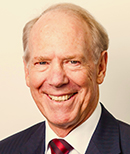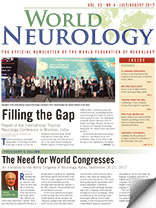
William (Bill) M. Carroll, MB BS, MD, FRACP, FRCP(E)
The World Federation of Neurology (WFN) has been a vital and integral part of my life for 18 years. I attended my first Council of Delegates meeting in 1999 to present the Australian bid to host the 2005 World Congress of Neurology, which was decided at the London WCN in 2001. From that time, my admiration, respect, and enthusiasm for the WFN has grown. The development and achievements of the WFN have been outstanding and made possible by the selfless contributions of all involved in the WFN so that the achievements of the WFN, accomplished with limited resources, have engendered a deep respect for our organization.
I have been fortunate to have observed first-hand what I believe to be the essence of the WFN. Not only its mission, “to foster quality neurology and brain health worldwide,” but its sense of fairness and service. It is a sense that sits comfortably with a well-known Australian trait of “a fair go for all.”
The WFN is an organization with relatively limited financial resources, yet its mission is broad and seemingly endless. Its annual spending on operating costs, infrastructure, and personnel comprises almost half of its average annual income. Its permanent staff number is only 2.5 FTE, but it is ably assisted by the 140 members of its 15 committees. With member societies, the regional organizations, and the quality of successive administrations, the WFN is forging a role as a global advocate and neurology educator. The recent formation of the African Academy of Neurology and its first conference in Tunis this year, and the development of four regional training centers in Africa, two each for the francophone and anglophone regions, are testaments to WFN’s strength of commitment to this role, as is the successful biennial World Congresses of Neurology. Such achievements also bring the essential benefit of enhanced visibility of the WFN within its membership and among agencies that assist the WFN.
I regard my two terms as an elected trustee, my term as first vice president, and serving as chair of the Membership, Fundraising, and Congress committees, as well as convener of the Global Neurology Network to have been a privilege and an opportunity to contribute to the team.
Why do I seek the office of president? The reasons are many, but they distill to four principle and complementary reasons.
First, I believe in what the WFN does and that I have the skills, experience, commitment, and understanding of the needs of the WFN to continue to grow the educational programs, such as those established in Africa and elsewhere. I also believe that I possess the vision for the direction for the WFN in the next four years and beyond.
Second, underlying the WFN’s mission is the recognition of the inequality that exists in the development and delivery of neurological care and education. To further tackle these systematically and successfully, the WFN requires an order of priorities. I propose to continue to target the inequity of access to neurological care, expertise, and education by encouraging member societies and their regional organizations to assist in the preparation of an inventory of “most urgent inequalities.” It is likely that some will be common and amenable to a general formulated plan of assistance while others will be specific to a country or region and demand a more individual approach. We must develop a plan, and we should do it together.
Third, and in parallel with developing an inventory of and the plans and programs to tackle inequalities, I will be exploring the opportunities for the WFN and its member organizations to expand their association with both our two largest regional neurology organizations, the AAN and the EAN, and with global government, non-government, and regional intergovernmental organizations. These might include the European Union, the Gulf Cooperation Council, the Asia-Pacific Economic Cooperation, the Pan American Health Organization, the World Federation of Medical Education, and the WHO, to mention some.
The approach would be to develop cooperative strategies similar to the Africa initiative and the way the WFN has interacted with the WHO via the World Brain Alliance and the Global Neurology Network. It would likely require the establishment of a task force drawn from within the WFN and, where necessary, from professional expertise outside the WFN. We would seek out potential partners, evaluate the opportunities offered by each, match them to the needs inventory, and prepare an approach for those selected.
Lastly, it has been an honor to have been involved with the WFN up to now and to have been nominated for president by the Australian and New Zealand Association of Neurologists and supported by the Japanese Society of Neurologists. Please see below a list of positions held and papers written for the WFN supporting my candidature.
Professional Experience
General
- 1988-1996 & 2001-2014: Head, Department of Neurology, Sir Charles Gairdner Hospital, Perth, Western Australia
- 1992-2001: President and counselor, ANZAN
- 1996-2004: Neurology editor, Journal of Internal Medicine
- 1998-2014: Chair, Multiple Sclerosis Australia Research Management Council
- 2003-Present: Editor (Asia and Pacific), Multiple Sclerosis Journal
- 2007-Present: Vice president, Pan-Asian Committee for the Treatment, Research, and Investigation of Multiple Sclerosis (PACTRIMS)
- 2008-2012: Vice president, Asian and Oceanian Association of Neurologists (AOAN)
- 2012: Western Australian of the Year — Business and Professions
- 2016-Present: board member, European Charcot Foundation
- 2016-Present: Honorary member, Chilean Society of Neurology, Psychiatry, and Neurosurgery
World Federation of Neurology
- 2001-2006: Elected trustee of the World Federation of Neurology
- 2005: President, XVIII World Congress of Neurology in Sydney, Australia
- 2005-2009: Chair, WFN Fundraising Committee
- 2009-2013: Chair, WFN Membership Committee
- 2009-2013: Member, Congress (Supervisory) Committee
- 2013-Present: Chair, Global Neurology Network
- 2014-Present: Chair, Congress Committee
- 2014-Present: First vice president, WFN
Papers
- 2006: Fundraising for the WFN
- 2010: Fairness in the WFN
- 2017: The Need for a Global Alliance in Neurology
